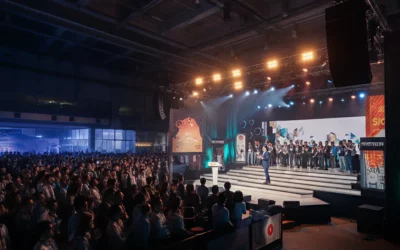Are you an event manager OR are you an event planner? Many professionals use them interchangeably.
In the event industry, there is no shortage of similar sounding titles and regardless of your tenure, a colleague’s title may not tell you everything their role entails. This can create communication problems from company to company, and even between your own team!
Miscommunication stems from the large overlap of duties for many event professionals. For a client, trying to understand which role they need, and which duties to assign can become confusing.
Just like any team, the larger it gets, the more intricate the titles and roles become. While we’ll avoid going through the laundry list of titles you may have heard of, let’s dissect the roles and responsibilities for the 2 most common titles in the industry: an event manager and an event planner.
So before you jump on Jooble, let’s figure out what you are searching for!
Event Planning is Developing a Compelling Narrative
If you can think of the client (or event strategist) as creating the vision for what the event should accomplish, the event planner is deciding what form the event will take on – They decide on the Who, What, When, Where, and How.
As the job title eludes to, an event planner does the majority of all pre-event tasks, and this means making decisions on key event elements that develop the big picture.
This role works closely with the client to design an event that aligns with their goals and objectives. Additionally, they work the event manager to ensure the plan is feasible.
Responsibilities for an event planner almost always include:
- Selecting a central theme
- Formulating the event budget
- Selecting the venue
- Negotiating contracts
- Identifying and sourcing vendors
- Creating a menu & hiring the caterer
- Identifying speakers and aligning content with the theme
- Choosing decor
- Managing invitations and communications
- Choosing event entertainment
Event Management is About Flawless Execution
What’s interesting between event planners and managers is that planners will spend months, perhaps years putting together an event that their event manager counterparts will then execute in just a matter of days.
Based on this, you might think event managers have it easy in comparison, but that’s far from the truth. The emphasis for this role is on actually seeing the event through, and putting any fires out on-site.
It also means this role is on-site and client-facing. The event manager has to be professional, experienced, and able to solve any issues on-site.
Because of the strict requirement for experience, generally speaking, event managers are more tenured than planners.
They typically have planning experience under their belt so they are familiar with the legwork that goes into an event, and this gives them an advantage for managing the moving pieces on-site – Which is what managing a flawless event is all about.
Here are some key responsibilities you would expect from an event manager:
- Arriving pre-show, and managing logistics until after everyone leaves
- Managing and coordinating a staffing agency, vendors, suppliers, and speakers
- Developing a parking plan with the venue
- Creating a health and safety plan that follows any company, venue, or local government compliance laws
- Monitoring the actual event
- Putting out any fires on-site
- Client interfacing
Successful Events Require an Experienced Planner and Manager
Many event professionals can probably look at their schedule over the last 12 months and realize that many times, responsibilities aren’t so black and white. Depending on the type of event, and how busy your team is, a planner or manager may find themselves with a longer-than-usual list of responsibilities.
The key is communication. The constant ebbing and flowing of any event on your calendar will require an event professional to be communicative, quick on their feet, and most importantly, willing to work as a team.
So while event management and event planning are often used interchangeably, in fact there are differences you should be aware of as you interface with other event teams!
You might also like…
Top 10 U.S. Meeting Destinations for 2026
Successful corporate events don’t just happen — they’re built on smart decisions, starting with...
The Trade Show Prep Guide: Boost ROI Like a Pro
Trade shows are a powerful way to elevate your brand's visibility, connect with potential...
President’s Club 2026 Ultimate Gift Guide
Luxury, Personalization, and Impact for Unforgettable Incentive Travel President’s Club isn’t just...
The Role of Corporate Event Managers is Evolving
Corporate events aren’t what they used to be. Gone are the days of basic cocktail hours and...
Revitalizing Sales Kickoffs: Strategic Insights for 2026
Gone are the days when Sales Kickoffs (SKOs) were just annual corporate pep talks. Today's SKOs...
Planning for Performance: The 2026 Guide to Mastering Incentive Travel
Here's Why Incentive Travel is Your Secret Weapon in 2026... Gone are the days when incentive...







